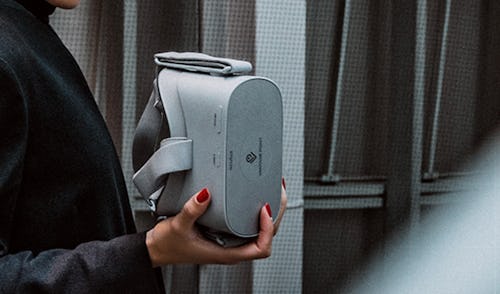Can VR really promote racial sensitivity at work?
Simulating harassment sounds murky, so I talked to the woman behind the idea.

Sexual harassment and racial bias are very real problems in many workplaces; that’s why we have a whole industry dedicated to training your co-workers to not be shitty people. Now, a tech company called Vantage Point is gamifying HR training by placing people in virtual reality harassment scenarios for, supposedly, the greater good.
Vantage Point was founded by Morgan Mercer, a two-time survivor of sexual harassment, per the company’s website. The company’s philosophy is founded on the premise that “immersive technology can drive empathy and fundamentally make the world more human.” Essentially, they believe that placing someone in scenarios where they witness someone being harassed could make them aware enough to change their behavior because traditional HR training is clearly not working. The Washington Post recently obtained one of Vantage Point’s videos, which involved a man putting his hand on a coworker’s thigh, while showing her a picture of a nude beach in their workplace kitchen. Other videos involve scenarios of racial bias. “You can step into the shoes of what it feels like to be a Black man,” Mercer told The Post.
Now if you’re like me, you probably have a lot of questions. Admittedly, I was very skeptical: While I understand that having strong emotional reactions to an injustice might be a good way to change someone’s behavior, I also wonder who this training is actually for. I worried that people who already experience racism or have experienced sexual harassment would be forced to re-live traumatizing scenarios via VR.
I am also a little uncomfortable at the thought that the only way our co-workers could be respectful of other people is if they witnessed or lived that trauma themselves. Just because someone witnesses harassment doesn’t mean they will empathize with the victim and not become a harasser themselves. I can’t help but feel like those who perpetuate wrongdoing already know that they’re doing something bad. A part of me doubts that seeing a scenario play out in 3D could trigger some form of latent empathy within them.
I decided to reach out and speak to Mercer to tell her about my concerns, especially about potentially triggering trauma in people who already experienced harassment in their everyday work lives. She told me that it was a concern she was aware of and that the company worked with trauma informed communications experts, therapists and sexual prevention experts to ensure that none of their content would be particularily triggering. Also, none of the VR scenarios happen in the first-person. Mercer is a biracial woman and has experienced both gender- and race-based harassment in the workplace. She reassured that the scripts are specifically vetted so that they don’t open psychological wounds.
Admittedly, I had assumed that their videos would involve overt instances of harassment — maybe a racial slur, or groping. Mecer told me that instead, Vantage Point would focus on much more subtle scenarios: One of the videos they deploy is about a woman being gaslit by her male subordinate who makes her seem irrational for speaking her mind.
“It’s bystander training, which has been proven to be the most effective form of training because we're actually teaching you communal accountability,” she tells me. “It’s not ‘I didn't do it, so I'm not wrong.’ It was, you know, ‘here's how I can take my actions to collectively create a safer space.’” In other words, the VR videos seem to be less about stopping bad people from doing bad things, but showing regular people the many subtle and insidious ways that harassment can happen in front of us.
If this prevents just one instance of sexual harassment or racial bias, then perhaps it’s worth giving this a chance. VR technology can be powerful and it’s exciting to think about what it could potentially do for marginalized people. Part of me is still skeptical about the the theory that more technology is really our way out of a crisis of empathy that is, in many ways, exacerbated by technology. It all feels idealistic — but sometimes that idealism can create real change.